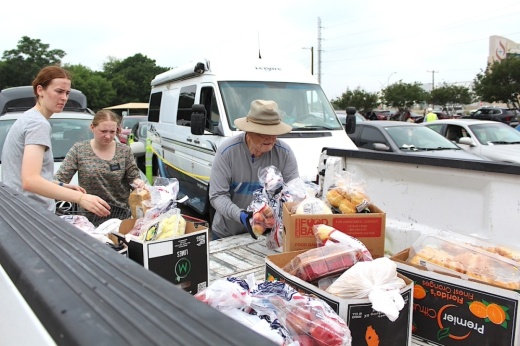The setup
The San Antonio Metropolitan Health District convened a meeting of a health equity network food insecurity work group June 20 at the San Antonio Area Foundation’s office.
Meeting facilitators said the work group—made up of representatives of local health care providers; urban farming and gardening organizations; and supporting entities, businesses and nonprofits—will help the city enhance strategies to boost local food assistance programs, especially to benefit residents who need them the most.
City staffers said the group will also address how unstable housing and inflation affects food insecurity. Lotus Rios, co-founder of the Harlandale Sunshine Pantry in the Harlandale neighborhood, will serve as work group co-chair.
Dr. Ryan Ramphul, a faculty member of the UTHealth Houston School of Public Health, was invited to address the work group. He told group members they could help elaborate on data gathered and conservations pursued by local officials citywide.
“It’s one thing to look at data based on census estimates and poverty rates. It’s a whole other thing to try and get into the community and talk to people about their experiences with food,” he said.
City officials said they already have a solid partner in the San Antonio Food Bank, where President and CEO Eric Cooper said lingering financial effects of the COVID-19 pandemic, and rising costs of food and housing have compounded challenges for many local families. Cooper said there is a difference between hunger and food insecurity.
“Our bodies hunger for food from breakfast to lunch or from lunch to dinner. But someone who’s food insecure is unable to remedy the symptoms of hunger. They don't know where their next meal is coming from, and that makes them insecure in their ability to feed themselves and their family,” Cooper said.
Put in perspective
According to findings in the city’s SA Forward health equity dashboard, 14% of Bexar County residents were deemed food insecure, or unable to regularly and easily access fresh, nutritious foods. The dashboard also showed 16.2% of San Antonio households rely on food stamps and Supplemental Nutrition Assistance Program benefits to get basic food.
Metro Health officials said research shows food insecurity raises the risk for obesity, diabetes and heart disease.
A 2022 Bexar County Community Health Needs Assessment showed several low food access areas—defined as 1 mile from a grocery store or other source of healthy food in an urban region—scattered across Bexar County.
Many such areas are located in what the assessment called low-income regions on the south, east and west sides of town, but some low food access areas exist on the north side, including near the San Antonio International Airport, the South Texas Medical Center and The University of Texas at San Antonio/La Cantera region.
Diving in deeper
Eric Cooper said he and his colleagues at the San Antonio Food Bank, and their many private sector partners, do what they can to do more than just provide food. SAFB helps feed 105,000-plus people weekly directly and through partnerships across Bexar and 28 surrounding counties.
“The food bank thinks of its work as both feeding the line—meeting that need for calories, nourishment and physical food—and shortening the line. That's about workforce development, job training and placement, and moving people to self-sufficiency and self-reliance to help them be more secure,” Cooper said.
What they’re saying
Coker Methodist Church in North San Antonio is one of the food bank’s local distribution sites.
Church staff and volunteers work out of Coker’s food pantry to provide more than 300 people with fresh produce, dairy, meat and canned goods each Thursday.
Associate Pastor Rev. Jose Mercado said visitors to Coker’s weekly food distribution range from young area families and elderly neighbors to Central American migrants, some of whom struggle to find permanent shelter while they strive to stabilize themselves stateside.
Retired U.S. Naval Sgt. Billy Duncan, a north side resident, said he has attended Coker’s weekly food distribution for several years. Duncan said it is hard at his age to get around and seek affordable, nutritious food in his neighborhood, but he said Coker’s food giveaway feels convenient and welcoming.
"I feel blessed. Everybody treats me really, really good here,” he added.
Going forward
City officials said City Council will be briefed on the food insecurity work group's progress this September.
Metro Health representatives said, over the rest of this summer, the city will facilitate pop-up markets at different locations where people can get fresh food and information on local assistance programs. Upcoming markets include:
- June 26, 6-9 p.m., Gardopia Gardens, 619 N. New Braunfels Ave., San Antonio
- July 26 (time TBA), YWCA San Antonio, 2318 Castroville Road, San Antonio
- Sept. 21 (time TBA), YWCA San Antonio, 2318 Castroville Road, San Antonio
- Sept. 22 (time TBA), Gardopia Gardens, 619 N. New Braunfels Ave., San Antonio





